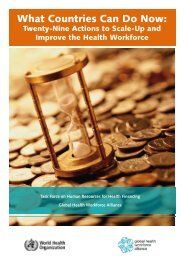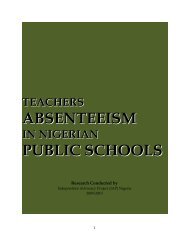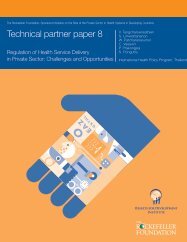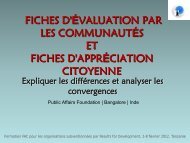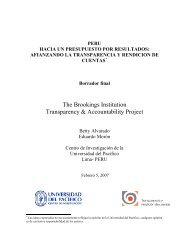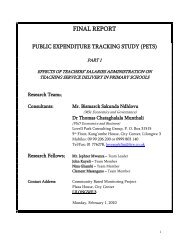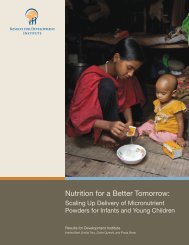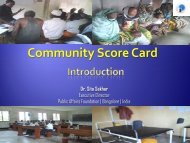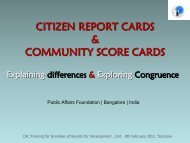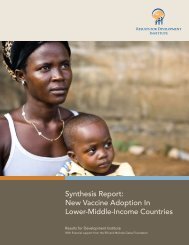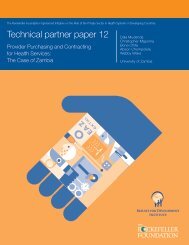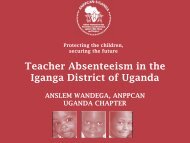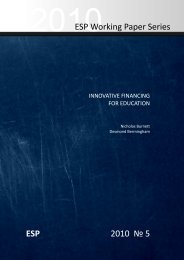Innovative Secondary Education For Skills Enhancement
Innovative Secondary Education For Skills Enhancement
Innovative Secondary Education For Skills Enhancement
Create successful ePaper yourself
Turn your PDF publications into a flip-book with our unique Google optimized e-Paper software.
Changing the Expected Outcomes<br />
for <strong>Secondary</strong> School Students:<br />
21st-Century <strong>Skills</strong> and Beyond<br />
It is widely acknowledged that the basic skills that formed<br />
the foundation of 20th-century education systems will not<br />
suffice for future schools. The so-called 3Rs of arithmetic,<br />
writing, and reading, though still important, have been<br />
supplemented with the 4Cs of collaboration, critical<br />
thinking, communication, and creativity (Robinson 2010).<br />
Students are being pushed to become prepared for college,<br />
careers, and citizenship in the 21st century. To be collegeready<br />
and work-ready, schools must find ways to equip<br />
their students with the skills and knowledge necessary for<br />
success in information, media, and technology as well as<br />
traditional roles in management and teamwork on large,<br />
longitudinal tasks with strict deadlines and specific objectives<br />
to be met.<br />
New literacies that we must develop in the 21st century<br />
include global awareness, financial, economic, business<br />
and entrepreneurial, civic, health, and environmental literacies.<br />
The skills synthesis paper confirms the importance<br />
of these skills for employers. Finding a way to develop<br />
them more effectively in schools remains a challenge in<br />
developed as well as developing countries.<br />
Beyond the School Walls—<br />
Open and Distance Learning<br />
Millions of students around the world are accessing secondary<br />
education through various forms of open schooling that<br />
allow them to study in their own time and at their own<br />
pace. John Daniel’s visionary book Mega-Schools, Technology,<br />
and Teachers (Daniel 2010) makes the persuasive case<br />
for the urgent need to rethink our model of the school as a<br />
single location where young people go to study eight hours<br />
a day, five days a week. He argues that this traditional<br />
model will not be able to cope with the 400 million additional<br />
students that will surge toward the secondary school<br />
system in the developing world over the next decade.<br />
Programs such as Telesecundaria in Mexico (a millionplus<br />
graduates), the National Institute of Open Schooling<br />
in India (1.5 million graduates), and the SLTP Terbuka<br />
(Open Junior <strong>Secondary</strong> School) in Indonesia (2.5 million<br />
graduates) have demonstrated that it is possible to deliver<br />
high-quality education at scale to secondary-aged students<br />
at a lower cost and a much wider reach than traditional<br />
face-to-face schooling.<br />
The key to success in open-schooling systems is building<br />
effective quality assurance mechanisms and accreditation<br />
systems to ensure that qualifications are accorded equal status<br />
to those obtained in the mainstream education system.<br />
Open access to education resources and a greater diversity<br />
of learning opportunities will form an increasingly important<br />
part of the education ecosystem in the 21st century.<br />
Figure 2: An educational ecosystem for the 21st century<br />
Ministry of <strong>Education</strong><br />
CURRICULUM<br />
POLICY<br />
Megaschools<br />
<strong>Education</strong> Institutions<br />
School Based Teacher<br />
LEARNERS<br />
Communities<br />
TEACHER-LEARNER<br />
Schools<br />
Learning Hubs<br />
Source: Daniel (2010).<br />
<strong>Innovative</strong> Models for <strong>Skills</strong> <strong>Enhancement</strong> in Africa and Asia 59



